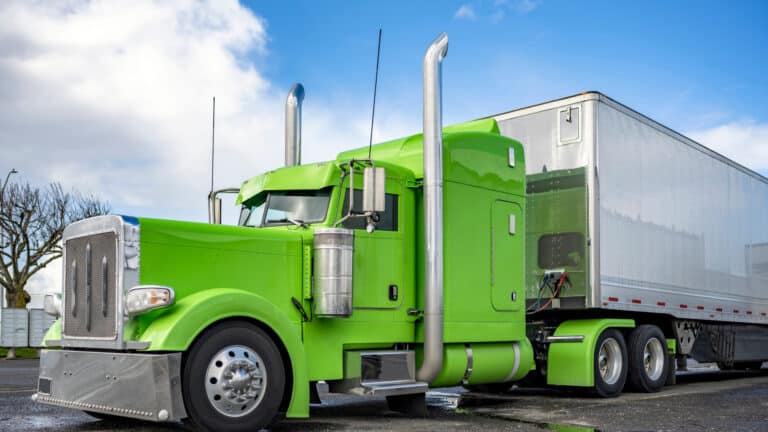Efficient logistics are crucial for business success, particularly in the trucking sector. Advanced fleet management technologies, like GPS tracking, provide carriers with methods to boost efficiency and secure a competitive edge. This article focuses on the essential process of choosing the best fleet tracking device for Canadian carriers.
We’ll spotlight the capabilities of HOS247, renowned for its dependable fleet tracking solutions. As we explore different facets of fleet tracking technology, the concluding part will emphasize the importance of partnering with trustworthy technology providers. This serves as a foundation for making well-informed decisions to improve fleet management strategies.
Best Fleet Tracking Devices in Modern Logistics
The best tracking devices offer motor carriers operational efficiency, safety, and compliance. Equipped with the ability to track in real time, these devices allow fleet managers to keep tabs on vehicle locations, fine-tune routes, and tap into valuable data analytics to increase productivity. The incorporation of GPS technology into fleet tracking systems provides accurate and trustworthy information that’s key for making informed decisions. By utilizing these technologies, logistics companies can enhance their daily operations and gather insights for strategic planning in the long run, resulting in better service delivery and cost reductions. The top GPS tracking systems share the following characteristics:
- Accuracy. Precision in GPS tracking is non-negotiable, as it provides fleet managers with exact location data. This precision is crucial for effective route planning, monitoring driver behavior, and boosting fleet safety.
- Durability. Fleet tracking devices must withstand tough conditions, including extreme weather, moisture, and rough treatment. Their ability to perform reliably under such conditions is essential for fleets operating across diverse environments.
- User interface (UI). The UI needs to be straightforward and easy to use. An intuitive interface simplifies the learning process for both drivers and fleet managers, enabling faster system adoption and more efficient operation.
- Connectivity and communication. Effective data transmission and the capacity for seamless integration with other systems (such as electronic logging devices (ELDs)) are critical. This ensures all components of the fleet management system operate in sync.
- Scalability. The best GPS fleet tracking devices are adaptable to fleets of any size, making them suitable for both small businesses and large corporations.
- Data analytics and reporting. Advanced analytics capabilities allow fleets to process and interpret large data volumes for insightful actions, ultimately enhancing operational effectiveness and reducing costs.
Market Leaders: Reviewing the Best Fleet Tracking Devices

Navigating the diverse landscape of fleet tracking devices can be a daunting task for fleet managers seeking to enhance their operations. With the right tools, fleets can achieve remarkable improvements in efficiency, safety, and compliance. This section delves into the offerings of market-leading fleet tracking devices, each brand distinguished by its unique features and capabilities.
HOS247
Offers an ELD-integrated fleet management portal with idling monitoring and optional IFTA calculations for comprehensive fleet management. Customer support is available seven days a week in several languages.
Geotab
Pricing available upon request. Offers a free demo, in-vehicle driver coaching tools, and dash cam connectivity. Known for safety reports and a comprehensive mobile app.
Samsara
Contact for custom pricing. Offers a 30-day free trial, in-vehicle driver coaching tools, and dash cam connectivity. Features include driver audio warnings and optional dashcam integration for enhanced safety.
Azuga
Certain devices support ELD, DVIR, and HOS for compliance. Offers in-vehicle driver coaching tools and dash cam connectivity. Known for vehicle diagnostics and a driver rewards program.
Verizon Connect
Pricing available upon request. Offers a 30-day free trial and in-vehicle driver coaching tools. Features an AI dashcam and a drag-and-drop scheduling calendar.
Rhino Fleet Tracking
Offers a free demo. A comprehensive solution for fleets looking for compliance and efficiency.
One Step GPS
Features PTO tracking and provides detailed monitoring of power take-off events for precise fleet management.
GPS Trackit
Provides temperature zone monitoring and asset tracking. Pricing details are available upon request. Ideal for fleets requiring environmental control measures.
Motive
Custom pricing with self-installation. Features live GPS tracking, AI dash cams, fuel and maintenance tracking, ELD compliance, and more on an integrated platform.

Benefits of HOS247 Fleet Tracking System
In the fast-moving world of fleet management, where accuracy, efficiency, and adherence to regulations are crucial, HOS247 distinguishes itself as a dependable leader. With a history marked by recognition for its commitment to reliability and superior service, HOS247 offers a range of advantages, including:
- Precise GPS tracking. At the heart of HOS247 lies its GPS tracking capability, offering a real-time virtual command center for fleet managers. Imagine having precise insights into the location, speed, and routes of every vehicle in your fleet. It’s not just about tracking; it’s about informed decision-making, optimal route planning, and enhanced fuel efficiency.
- Compliance with the ELD Mandate. In the intricate dance of fleet management, compliance is non-negotiable. HOS247 GPS integrates with our top-rated electronic logbook for Transport Canada compliance.
- Real-time GPS tracking. HOS247 offers real-time visibility into the location, speed, and routes of each vehicle in your fleet. This functionality empowers fleet managers to make informed decisions, optimize routes, and ensure timely deliveries.
- User-friendly interface. The platform is designed with a user-friendly interface, ensuring that technology works for you, not against you. Whether you’re a seasoned fleet manager or an owner-operator, the intuitive design allows for seamless navigation, putting the focus back on the road.
- Responsive customer support. HOS247 goes the extra mile by offering multilingual customer support services, including Spanish and Polish. Our customers can access support any day of the week and our call-back policy ensures you’ll never have to explain the issue twice.
- One-year hardware warranty. We stand by the reliability of our product. In case of malfunctions or issues with the hardware during the first year, we will replace your device for free.
- Flexible subscription plans with no contracts. HOS247 recognizes that one size doesn’t fit all. It offers flexible subscription plans, allowing users to choose what aligns with their specific needs. The absence of binding contracts ensures that users have the freedom to adapt their plans as required.
- Two-week trial. The two-week trial period allows users to experience the system firsthand. If, for any reason, they are not satisfied, a hassle-free refund policy ensures a risk-free exploration of the HOS247 tracking system.
The HOS247 fleet management system is a complete solution that goes beyond mere tracking. It’s a strategic partner for fleets, offering precision, efficiency, compliance, and real impact in the dynamic landscape of fleet management.
Choosing the Right Fleet Tracking Device for Every Fleet Size
Truckers looking for the best fleet tracking device must take several factors into account to ensure that the chosen solution aligns perfectly with their fleet’s specific requirements. Selecting the right solution is crucial for the efficiency, safety, and profitability of your fleet operations, regardless of the size of your fleet. Here are some considerations to guide your search:
- Fleet size and diversity. The size of your fleet and the variety of vehicles it comprises are fundamental in determining the type of tracking device needed. Smaller fleets might require simpler solutions, while larger fleets could benefit from more advanced systems with diverse functionalities.
- Type of cargo and route complexity. Different cargoes and route complexities demand distinct tracking capabilities. For instance, perishable goods require temperature monitoring, while high-value cargoes might need enhanced security features.
- Driver behavior monitoring. Tracking devices that offer insights into driver behavior, such as speed, braking patterns, and idle times, can be crucial in improving safety and reducing operational costs.
- Geographical coverage. Ensure that the device provides adequate coverage for the areas your fleet operates in. Some devices may have limitations in remote or international areas.
- Customization. Every fleet has unique needs. A one-size-fits-all approach rarely works in fleet management. Opt for devices and software that offer customization to tailor the system to your specific operational requirements.
- Integration capabilities. Your fleet tracking system should seamlessly integrate with other business systems such as fuel management, maintenance scheduling, and IFTA calculations. Integration enhances data accuracy and streamlines operations, leading to better decision-making and efficiency.
- Cost effectiveness. While it’s tempting to go for the cheapest option, consider the long-term value. Investing in a slightly more expensive system that offers more features and reliability could be more cost-effective in the long run.
- Future-proof technology. With rapid technological advancements, selecting a provider that keeps up with technology is wise. This ensures longevity and relevance of the tracking system.
The selection of fleet tracking devices is a decision that should be made after careful consideration of your specific fleet needs, size, and operational goals. Prioritize these elements to ensure that your investment remains valuable and effective as your business evolves.

Exploring the Future of Technology for the Trucking Industry
The landscape of fleet tracking technology is rapidly evolving, driven by advancements in various tech sectors. Understanding these emerging trends and their potential impacts on fleet management is crucial for staying ahead in the logistics and transportation industry. Let’s delve into what the future might hold for fleet tracking technologies.
1. AI and Machine Learning
Artificial Intelligence (AI) and Machine Learning (ML) are at the forefront of transforming fleet tracking systems. These technologies enable predictive analytics, which can forecast potential issues with vehicles, optimize routes, and enhance fuel efficiency. AI-driven systems can also analyze driver behavior, leading to improved safety and performance.
2. Internet of Things (IoT) Integration
IoT has revolutionized fleet tracking by enabling real-time data collection from a network of connected devices. This integration allows for comprehensive monitoring of vehicle health, cargo condition, and environmental factors, ensuring more efficient fleet management.
3. Autonomous and Electric Vehicles
The rise of autonomous and electric vehicles will significantly impact fleet tracking. Autonomous vehicles, equipped with advanced sensors and tracking systems, promise to enhance route optimization and reduce accidents. Electric vehicles will require new tracking parameters like charging station locations and battery health monitoring.
4. Blockchain in Logistics
Blockchain technology is starting to make its way into fleet management, offering heightened security and transparency for transactions and tracking. This can revolutionize supply chain management by providing immutable records of deliveries and transactions.
The future of fleet tracking is undoubtedly exciting, filled with innovations that promise to transform how fleet management is conducted. Staying abreast of these trends and preparing for their integration into existing systems will be key for fleet managers and companies looking to maintain a competitive edge in the market.
The Importance of Selecting a Dependable Technology Provider for Fleet Management

As we briefly discussed before, choosing a dependable technology provider is a critical necessity for effective fleet management. The provider you select plays a significant role in the efficiency, safety, and profitability of your fleet operations. Here’s why making the right choice is essential and how a reputable provider can lead to lasting benefits and stability in fleet operations:
- Provider reputation. The reputation of a technology provider is a strong indicator of their reliability and service quality. Reputable providers have a history of delivering effective solutions and achieving customer satisfaction. It’s vital to research the provider’s track record, customer feedback, and case studies to gauge their capability to cater to diverse fleet needs.
- Robust customer support. Customer support is crucial, particularly in fleet management, where operational delays can lead to significant financial impacts. Providers offering dedicated support teams help quickly resolve issues, ensuring minimal disruption to your operations. This encompasses technical assistance, training, and help with updates or troubleshooting.
- Update frequency. A provider’s commitment to regular updates demonstrates their dedication to continuous improvement and compliance with evolving regulations. Keeping fleet management solutions up-to-date is essential for maintaining efficiency and adhering to industry standards.
- Technology adaptability. With rapid advancements in the industry, the adaptability of the technology offered is critical. Providers committed to innovation guarantee that your fleet management systems remain relevant. This includes compatibility with new trends and technologies such as AI, IoT, and electric vehicle monitoring, increasingly important in modern fleet management.
Selecting a technology provider for fleet management is a strategic decision impacting various operational facets. Considerations like the provider’s reputation, customer support, update practices, and technological adaptability are key to this decision. Choosing a reputable provider like HOS247 not only addresses your current requirements for the best GPS tracking device for fleet management but also prepares your fleet for future challenges and opportunities. This choice is an investment in your fleet’s operational efficiency and long-term resilience.

As an expert in B2B and B2C sales, I’ve dedicated myself to perfecting sales processes and client retention strategies in the logistics and trucking industry. I have significantly contributed to the expansion of the ELD service, catering to retail and wholesale clients in need of HOS247 ELD solutions. My unwavering commitment to implementing state-of-the-art sales techniques and technologies ensures the continuous growth and success of businesses I work with.










With the elog mandate in effect, business owners risk facing serious penalties and expensive fines for non-compliance, so the reliability of an electronic logging device has become one of the most crucial characteristics to consider. Are you a motor carrier

Trucking companies need to find solid ELD solutions that help them stay compliant once the mandate is fully enforced. Making a poor choice of electronic logbook could be quite costly and time consuming for trucking businesses. Not only can it

Transport Canada has mandated that most commercial drivers who are required to maintain records of duty status must do so through an electronic logging device come January 1, 2023. These devices help monitor drivers’ time on the road to meet
